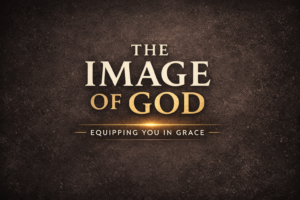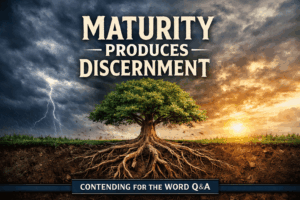⏱️ Estimated Reading Time: 6 min read
Your digital device is already out of date. The latest upgrade is behind the curve before it’s even released. But don’t worry. They’ll sell you the next operating system (they fixed the bugs in the last one), a sharper camera (more focus and greater detail), and better connectivity soon enough.
New. Improved. Improving. Latest.
Our digital devices are always dependent on upgrades. But not God. He cannot be upgraded. He cannot be improved. He has no flaws to fix.
The language of improvement can never be truthfully applied to the God of the Bible.
Anselm and the God Who Doesn’t Upgrade
In his book, None Greater, Matthew Barrett shares how the Church Father Anselm impacted his understanding of God. Barrett explains, “I had read handfuls of popular, contemporary Christian books about God, but none of them took God as seriously as Anselm. He asked questions that no one else was asking. The central question was this: Is God the most perfect being?”
If we could compare God against all other beings, would we find him to be the most perfect being? Yes!
Barrett goes on to reveal how central this concept is to orthodox Christianity, “That God is the most perfect, supreme being there is cannot be denied by anybody claiming the Christian faith. […] God is, as Anselm so famously said, ‘something-than-which-nothing-greater-can-be-thought.’” (45)
There is nothing and nobody greater than God. By implication, God cannot become greater than he is. God will not be more glorious tomorrow than he is today. God is, right now, as beautiful and wonderful and great as he ever has been or ever will be. He cannot improve. He cannot change. He is immutable.
James connects God’s giving of good gifts to his unchanging nature, “Every good gift and every perfect gift is from above, coming down from the Father of lights, with whom there is no variation or shadow due to change” (James 1:17). His attributes must also be understood in light of his immutability. God did not go through a process of becoming loving, holy, gracious, or just. If he is unchanging, he has always been these things.
God’s unique claim to be worthy of our worship is directly tied to his immutability. He has always been worthy of our worship. And he always will be. He did not go through a process of sanctification as we do. He did not mature as we do. He does not upgrade as our devices do.
Comfort in Our Unchanging God
With technology, we find comfort in upgrades. With God, we find comfort in immutability. With tech, we hope that it can improve and can change. With God, we hope because he cannot improve and cannot change.
In Psalm 102, the Psalmist finds deep comfort in our unchanging God. The Psalm opens with a cry of lament. The author writes, “my days pass away like smoke” (vs. 3) and “are like an evening shadow” (vs. 11). He summarizes his sorrow, “I wither away like grass” (vs. 11). Smoke, shadows, and withering grass illustrate the temporary nature of creation and created beings.
From the fickleness of his own days, the Psalmist turns to God, “But you, O LORD, are enthroned forever; you are remembered throughout all generations (vs. 12).” His rule and reign have no end. But an eternal throne is no comfort if a dying king occupies it. Yet the Psalmist rejoices that God does not age as other kings do. He is not subject to the decaying effect of years and decades. He does not grow weary or old. And he will not merely be remembered as a god in the past but revered as God ever-present. He will never be replaced by a newer model.
Passing the time threatens the Psalmist. Each passing day brings him closer to death. His rescue must come from one who is beyond time. The Psalmist celebrates that God will not only rescue him individually but also deliver Zion. “You will arise and have pity on Zion; it is the time to favor her; the appointed time has come.” (Ps 102:13). He who is not subject to time will care for Zion at the appointed time. He will do the same for you (Luke 12:32). He who always has been and always will be will one day receive praise from a “people yet to be created” (vs. 18). Technology we can not yet imagine will produce benefits we do not yet enjoy. The Psalmist rejoiced that people not yet created would glorify God.
The Psalmist concludes:
Of old you laid the foundation of the earth,
and the heavens are the work of your hands.
They will perish, but you will remain;
they will all wear out like a garment.
You will change them like a robe, and they will pass away,
but you are the same, and your years have no end. (Ps 102:25-27)
God will not change. He will never expire or be out of date. There will be no upgrades to his person or purposes.
We Discard What Goes Out of Date
You probably have some digital devices which have long gone out of date. An old cell phone sits on a shelf in my closet. Every once in a while, I think about what pictures might be on it. My previous laptop is sitting in a cabinet with its power cord wrapped up nearby. I doubt if it would even turn on. Our garage has a small bin with discarded cords and other electronic equipment we no longer use. They have grown out of date. They’re no longer useful.
We discard digital devices that go out of date. At best, we recycle them, and they are used for parts.
None Greater, “there is no means whatsoever by which corruption can injure our God.” Our devices and the operating systems which guide them will pass away. They will be replaced by something faster, better, and improved—the earth which God created groans even now. But the Creator does not groan as the creature does. He is unchanging.
He is not to be discarded but worshiped.
This unchanging God is known in the person of Jesus Christ. So the author of Hebrews attributes the words of Psalm 102 to Christ in Heb 1:10-12. He later exults, “Jesus Christ is the same yesterday and today and forever” (Heb 13:8). With those words, he invites us to join him in praise. He invites us to worship this unchanging Christ. We can rejoice in the words of Gabriel, “And the Lord God will give to him the throne of his father David, and he will reign over the house of Jacob forever, and of his kingdom there will be no end” (Luke 1:33). No end. And no updates are required.



